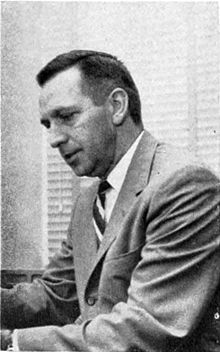- Donald Cressey
-
Donald Cressey 
Donald Cressey in 1960Born April 27, 1919
Fergus Falls, MinnesotaDied July 21, 1987 (aged 68)
Solvang, CaliforniaAlma mater Iowa State University, Indiana University Occupation Sociologist, criminologist, penologist Spouse Elaine Children Martha, Ann, Mary Donald R. Cressey (April 27, 1919 – July 21, 1987) was an American penologist, sociologist, and criminologist who made innovative contributions to the study of organized crime, prisons, criminology, the sociology of criminal law, white-collar crime.[1][2][3]
Contents
Life and work
Born in 1919 in Fergus Falls, Minnesota, he obtained his bachelor's degree from Iowa State College in 1943 and earned his Ph.D. from Indiana University in 1950.[4] He taught sociology at the University of California, Santa Barbara.[4] Along with Edwin Sutherland, he co-authored Principles of Criminology, for 30 years the standard text in criminology.[1][2][4] He also wrote Other People's Money, a study of embezzlement, and co-authored the popular textbook Social Problems.[2] After his retirement, he was president of the Institute for Financial Crime Prevention, a foundation for the research of white-collar crime.[4]
He served as a consultant on organized crime for the President's Commission on Law Enforcement and Administration of Justice in 1966 and 1967.[4] Based on research conducted in this capacity he wrote the acclaimed Theft of the Nation, a treatise on the Cosa Nostra, and later the smaller Criminal Organization, in which he extended his conceptualization of organized crime to include criminal groups other than the Cosa Nostra.
Cressey is credited with the theory of the "fraud triangle," three elements that must be present for occupational fraud.[5]
Dr. Cressey died in Solvang, California, in 1987. He was survived by his wife, Elaine, and three daughters (Martha, Ann, and Mary).[4]
Awards
The Donald Cressey Award is bestowed annually on an American academic by the National Council on Crime and Delinquency[6] for outstanding academic contributions to criminology.[2]
The Cressey Award is bestowed annually by the Association of Certified Fraud Examiners on one of its members for lifetime achievement in the detection and deterrence of fraud.[2]
Works
Solely authored works
- Criminal Organization: Its Elementary Forms. New York: Harper and Row, 1972. ISBN 006131692X
- "Methodological Problems in the Study of Organized Crime as a Social Problem." Annals of the American Academy of Political and Social Science. 374 (1967).
- "Organized Crime and Inner-City Youth." Crime and Delinquency. 16:2 (1970).
- Theft of the Nation: The Structure and Operations of Organized Crime in America. New York: Harper and Row, 1969.
- Other People's Money: A Study in the Social Psychology of Embezzlement. Montclair, N.J.: Patterson Smith, 1973. ISBN 9780875852027
Co-authored works
- Coleman, James W. and Cressey, Donald R. Social Problems. New York: Prentice Hall, 1980. ISBN 0673996530
- Sutherland, Edwin H. and Cressey, Donald. Principles of Criminology. 11th ed. Lanham, Md.: AltaMira Press, 1992. ISBN 0930390695
References
- ^ a b Akers, Ronald L. and Matsueda, Ross L. "Donald R. Cressey: An Intellectual Portrait of a Criminologist." Sociological Inquiry. 59:4 (October 1989).
- ^ a b c d e Salinger, Lawrence M. Encyclopedia of White-Collar & Corporate Crime. Thousand Oaks, Calif.: SAGE, 2004. ISBN 0761930043
- ^ Hawkins, Gordon. The Prison: Policy and Practice. Chicago: University of Chicago Press, 1982. ISBN 0226320006
- ^ a b c d e f "Prof. Donald R. Cressey, 68, Expert on Sociology of Crime." New York Times. July 28, 1987.
- ^ Wells, Joseph T. Principles of Fraud Examination. Wiley, 2008. ISBN 0470128831
- ^ National Council on Crime and Delinquency Web site.
Categories:- 1919 births
- 1987 deaths
- People from Fergus Falls, Minnesota
- American criminologists
- American sociologists
- Penologists
- University of California, Santa Barbara faculty
Wikimedia Foundation. 2010.
